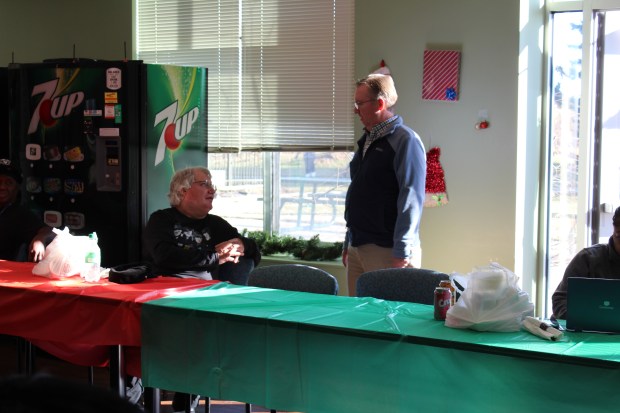Some of the region’s least visible people are among the beneficiaries of billionaire philanthropist MacKenzie Scott’s first round of giving through her Yield Giving nonprofit.
An influx of resources thanks to a $1 million Yield Giving grant will help South Suburban PADS better deliver services to people who are struggling with homelessness as well as food and housing insecurity, officials from the organization said.
The grant is especially helpful because the number of people in need keeps growing in a region that is sometimes overlooked.
“It’s really huge,” said Doug Kenshol, executive director of South Suburban PADS. “We serve a region — the south suburbs of Chicago — that is really under-resourced. We have very high rates of poverty, housing instability and homelessness and yet there’s a mismatch. We don’t have the resources to address them.
“We live in the shadow of Chicago and most of the philanthropic resources and government assistance goes to Chicago.”
He estimated there are almost 13,000 homeless people in the region, and more than 3,000 of them are school kids under age 18. Nearly 50,000 people in the south suburbs experience extreme poverty, Kenshol said. South Suburban PADS, which stands for Public Action to Deliver Shelter, used to operate in a rotating base of church properties where people could spend winter nights. The agency now offers emergency stays in hotel rooms, along with affordable housing, supportive services and health care assistance.
The group’s main office is in Chicago Heights and it operates a Wellness Center in Country Club Hills where some people experiencing homelessness can stay.
More than 6,000 organizations applied for Yield Giving grants, and less than 5% were selected. Lever for Change helped with the application/selection process.
“She (MacKenzie Scott) did all this vetting, determined this is a great organization and that maybe we should be paying attention to it,” said Kenshol, who wrote the grant request. “I think it kind of credentialed us.”
Getting noticed is another way to help South Suburban PADS help more people, Kenshol said.
“We hope and believe we’ll be able to use this — not only the gift itself — to provide more resources, and we’ll be able to leverage this gift to raise our profile and secure more gifts from funders,” he said. “I think we’re a little bit invisible down here in the south suburbs.”
Providing shelter in hotel rooms, a move necessitated by the onset of the COVID-19 pandemic and continued in years since, costs roughly $75 per night, so PADS spends close to $2 million per year on that, he said.
Courtney Suchor, who directs emergency shelter efforts for the organization, said they hope to purchase another building to provide short term shelter, which would be much more efficient and humane than hotels.
“Since the pandemic, we’ve moved more toward providing non-congregant shelter,” explained Suchor. “We’ve really found that providing people their own space with their own bathroom helps people to feel more in control of their lives and helps them to have easier access to employment and other services that will make a difference for them in the long-run, rather than moving from place to place each day.”
But there are a variety of needs.
“For us, this grant isn’t just about us buying a building, but expanding our overall capacity as an agency to meet the needs of people who are in a housing crisis,” Suchor said. “So it may help us to expand our staff to provide more specialized services for needs that clients have, whether they are job or health related.”
Suchor pointed out staff also work to prevent homelessness by offering outreach services to help people find housing. They have volunteers who cook meals for guests, conduct diaper and hygiene drives and more, but funding and donations are still sorely needed, she said.
Kenshol said a variety of needs are combined when families experience homelessness.
“It’s very difficult to serve a family with five or six children in a hotel room,” she said. “It would be better and more humane for them in a two-bedroom apartment.”
Regional services also need improvement, he said, explaining they need more funds to subsidize housing from the Suburban Cook County Continuum of Care and a way to help people access housing faster. Kenshol said they serve 100-150 people nightly, but 200 people are on the waiting list for shelters.
She agreed that being chosen by MacKenzie Scott validates the work of South Suburban PADS.
Kenshol said credit for the grant should go to everyone involved in SS PADS.
“It’s a testament to all of the staff, volunteers and supporters who do this work each and every day,” she said. “Our staff could work anywhere and yet they’ve chosen to work here and to help people who are experiencing the worst day of their life.”
Janice Neumann is a freelance reporter for the Daily Southtown.





